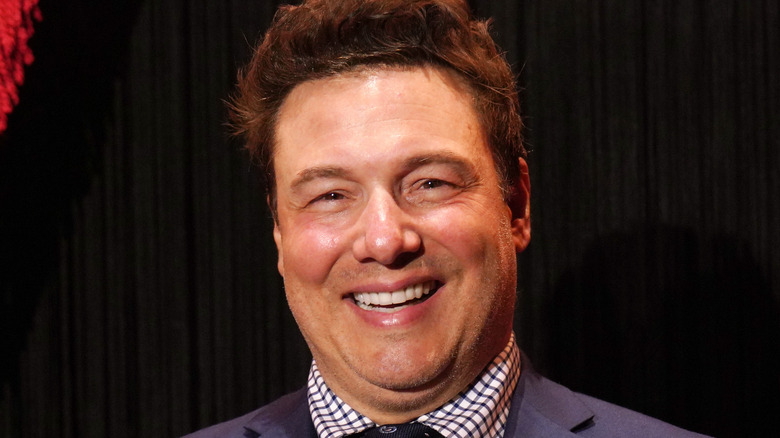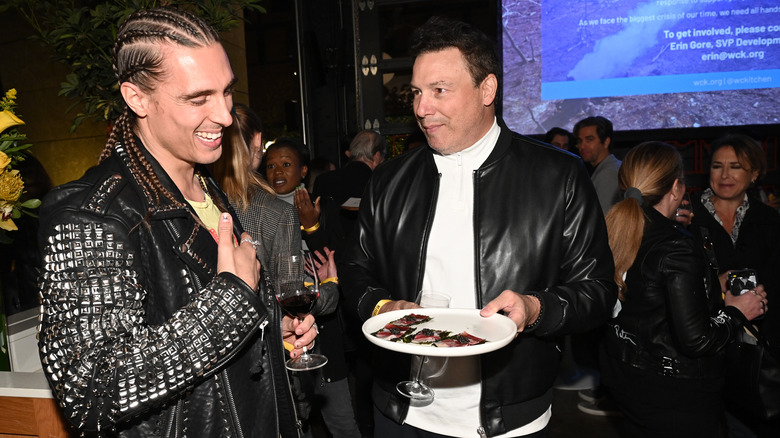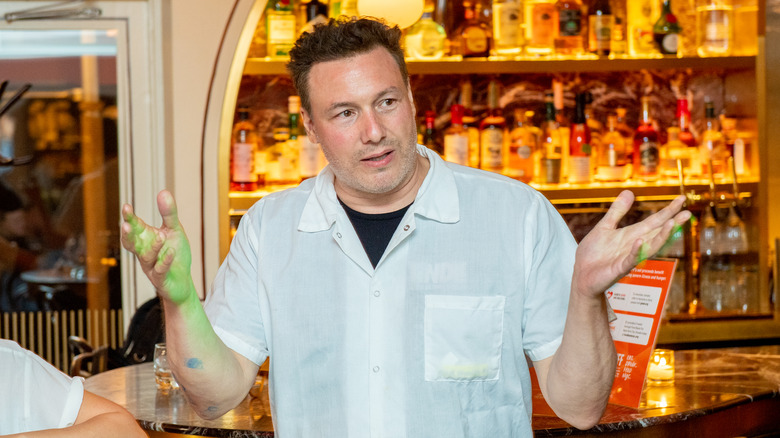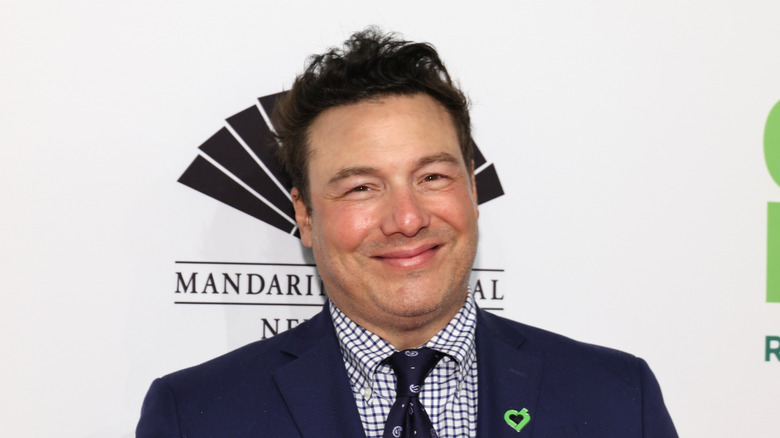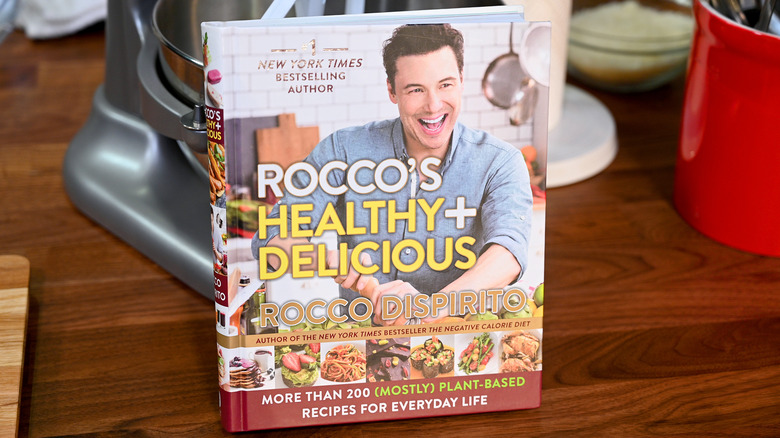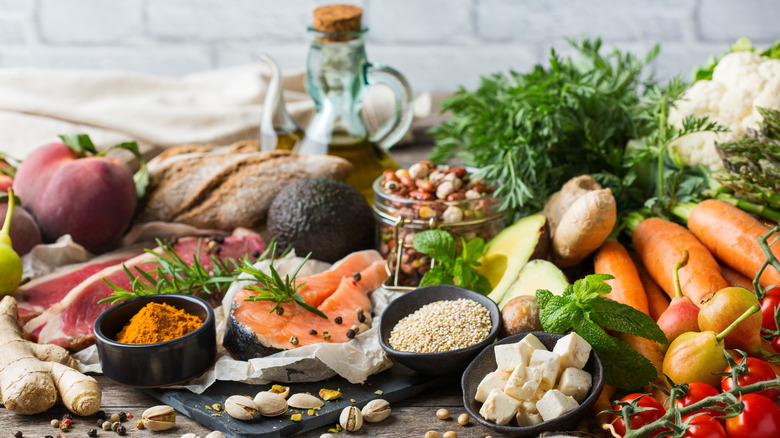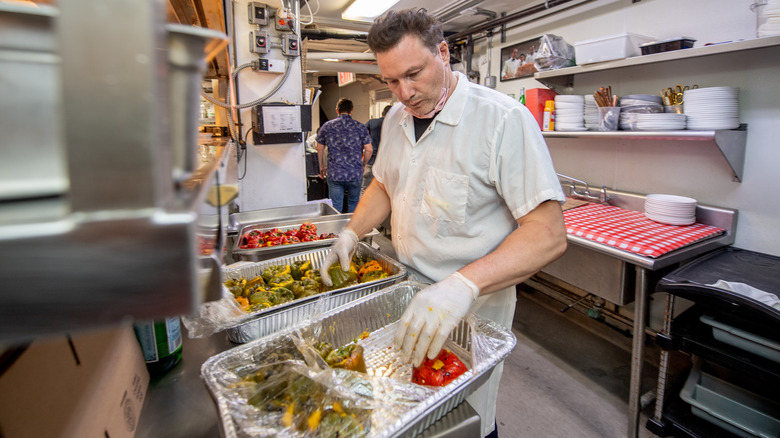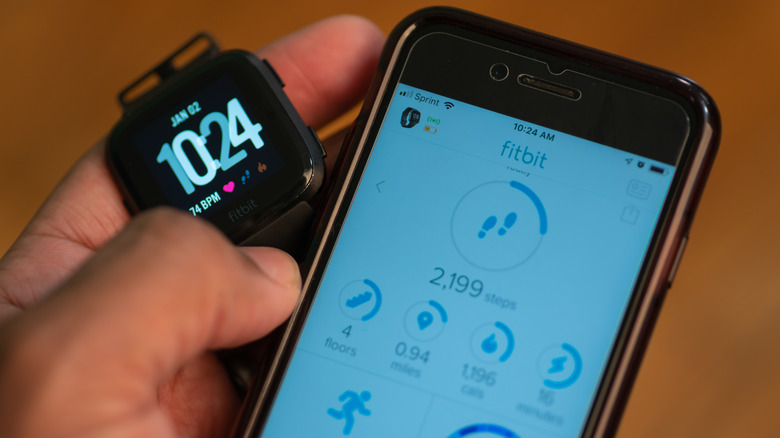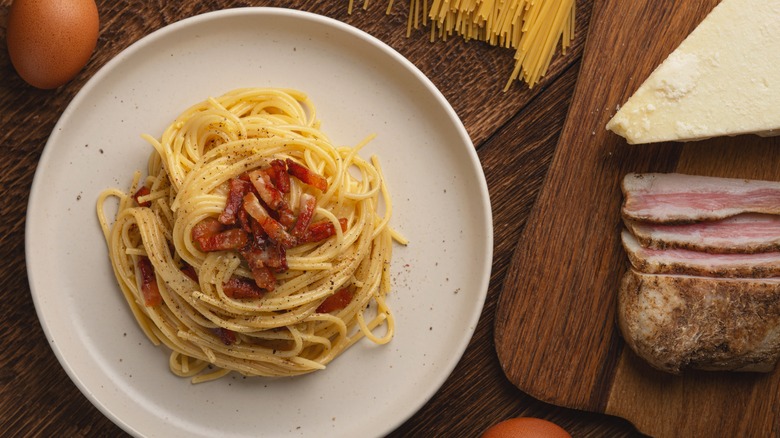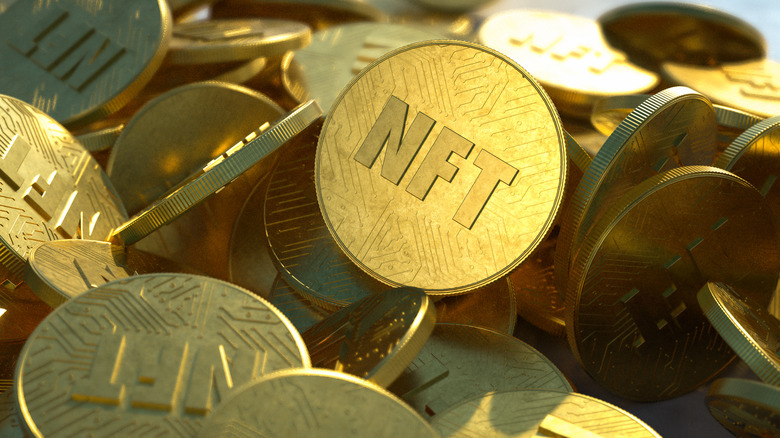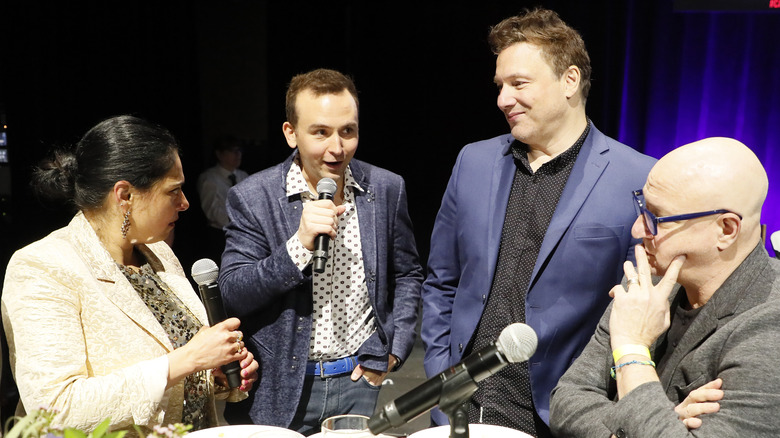Rocco Dispirito Talks Food Festivals, NFTs, And His Upcoming Cookbook - Exclusive Interview
We may receive a commission on purchases made from links.
Ever since he launched his first restaurant, Union Pacific, in the late '90s, Rocco Dispirito has been a culinary star (via Rachael Ray Magazine). That innovative Asian and French-inspired restaurant earned him a coveted three-star review from The New York Times and launched him into the culinary firmament. After this early success, he starred in "The Restaurant," which was the first restaurant-centered reality show. The show was set in his second restaurant, Rocco's, an Italian-American place where his mom worked in the kitchen. He's earned numerous accolades, including a James Beard Award for his first cookbook, "Flavor," and recognition from People Magazine as the "Sexiest Chef Alive."
After his early days as a darling of the New York City restaurant scene, Dispirito became a food media fixture with appearances on numerous TV shows. He's also a prolific and acclaimed cookbook author with 13 recipe books under his belt, per his website. His more recent work is frequently centered around healthy eating. The busy chef sat down with Mashed for a wide-ranging interview to discuss his love for food festivals, his work as a private chef helping clients reach their health goals, and his forays into the NFT space.
The magic of food festivals
You just hosted the Dan's Chefs of the Hamptons food festival. What was that like?
It was the first festival of the summer, and Dan's is ... it sounds like they're interested in creating more of these special events, and it went really well. We had about 15 wonderful local chefs in a really beautiful setting at East Hampton Point Marina Resort. All went well. I got to hang out with some old friends, some people I used to work with a long time ago, so things were great.
Do food festivals and events like that feel more special in the wake of the pandemic?
That's a great question. I wasn't sure what to expect, but food festivals have definitely become a higher priority experience for people. This is something we probably took for granted a little bit prior to the pandemic, and you can tell, from an experiential POV, that there's pent up demand for this kind of thing.
I also think food festivals are a really unique combination of a great social scene, plus an activity that everybody agrees on. We all love to eat, and drink, and be around great food and great chefs. I call it the pandemic buster, or the antidote for the post-pandemic blues. It's a great way to get people back together, in a safe outdoor setting, and do something fairly innocent, and have fun doing it. Plus, [we're] supporting great charities along the way.
The challenges of being a public figure who's an introvert
I've seen you in other interviews describe yourself as kind of an introvert. Do you do something to hype yourself up for a public appearance like this?
[Laughs] Where did you read that? I would definitely consider myself an introvert, in a profession where you have to be an extrovert. Just like cooking, and the training required to learn how to do that, being an extrovert took some training as well. We can get into that story another time if you want; it's a whole thing.
What we do for a living is make people happy, and if you're an introvert, you're not in a place to make people happy. It's actually a great lesson, because a lot of chefs do like to be heads down in the kitchen and focused on their food, but when we do that, we're not really being our most generous selves.
Being an extrovert means you're engaged 100% in the profession. You're doing your job, which is to go out and make sure people know that you love them, you love that they're there, and you're doing everything you can to make sure they have a good time. It's an interesting dichotomy, being a person who developed a skill set that has to be displayed publicly, but at the same time, really wanting to be quiet about it. It's something a lot of us struggle with.
For me, it's a 30 year question of, "What do you spend time on: creating the product, or being the product, or marketing the product?"
When you are the product, it gets even more complicated, but food festivals are different than running a restaurant, in that everything is happening in the same room, usually. People are mingling. There isn't a formal back of the house or a formal front of the house. Crossing the great divide between the back and the front is something that happens at food festivals, so it's a little easier for both sides. What makes food festivals great is the access to chefs and chefs' access to customers.
What Rocco Dispirito is up to this summer
Do you have any more events coming up in the summer that you're excited about?
I do, yeah. The Chefs of the North Fork is [June] 25th. We have Rosé Soiree on [July] 9th, and Grill Hampton on [August] 5th. We also have the City Harvest Pino Luongo Legacy Event. Pino Luongo is a terrific restaurateur, who I've known for close to 30 years. I'd like to only admit 10 years in public, but it's about 30. He was a major pioneer of Italian food, and Tuscan food specifically, and City Harvest is putting together an event to honor him. ome other great chefs will be there, like Michael Schlow, so it should be fun. That's on August 2nd.
That sounds like a great time.
It should be. It's a really great example of the kind of extrovert you're supposed to be, walking around at this event, making sure everyone feels the love.
Why Rocco Dispirito is passionate about healthy living
Switching gears a little bit, a lot of your work in the last couple of years has been centered around healthy living. What inspired you to head in that direction?
[From 2004 to 2006], a couple of things happened. I started to appear on The Biggest Loser as a chef coach, and I started to do triathlons for fun. I say that with a wink in my eye, because nothing is fun about a triathlon, except the finish line. I was starting to learn how to be mature with my own health issues.
Everything was pointing me down the road of eat less, move more, start to look at the quality of the calories you're consuming. It's funny, because I was really known for my indulgent flavors. My first two books were called "Flavor" and "Rocco's Italian-American," and they were all about indulgence. When I started to pitch a healthy concept, it was met with some skepticism.
My first book on the subject, which included a diet plan and lots of healthy recipes with what I would call one-for-one replacements in the recipes for sugar and junk carbs, was an instant New York Times Best Seller. It was one of the rare times where you read the market and you get it right. I've been writing health and wellness books ever since.
I'm working on a new book that's called "Rocco Happy at Home," which will be a little less focused on health and wellness and a little more focused on what people can cook at home easily to maximize flavor. That's coming up in the next year, but the health and wellness is something we all have to take seriously and work on. It's a struggle for me, just like it is for everyone else, but I do my best.
The challenges of eating healthy
Do you think that there's a sacrifice involved in eating healthy, or do you think that you can cook as flavorfully when you're focusing on your health?
If you look at the Mediterranean diet, you would probably say that everyone in that part of the world is not sacrificing flavor, taste, indulgence, or pleasure at all, but they're eating what's considered the most balanced and sustainable diet known to man over thousands of years. [It's] a diet where most of your calories come from fruits and vegetables, a little bit comes from animal protein, a little bit comes from animal fat; that is the most sustainable diet pattern.
But, yes, if you're trying to make up for lost time, like anything, if you've allowed yourself to get to a place where you have to catch up, there will be some sacrifice, or some hard work, or both, for you to get back to your fighting weight, or your best shape, and everybody knows what that is for themselves. There's certainly not a one-size-fits-all situation. But once you get there, you can sustain it.
[In my experience], you can sustain all those gains with a little bit of moderation and balance, and it's really not that difficult. The hardest part for most people, especially as you get into your 30s, is realizing you probably can't drink as much alcohol as you thought you could, you probably need to work out a little more than you thought you needed to, and you have to think about food a little more than you have been up 'til now. That's usually the same for most people.
What it's like to cook for private clients
You've been running a business cooking for private clients, right?
That's right. When I wrote the book "The Pound A Day Diet," I created a test to prove the theory that a pound-a-day diet was possible, or that you could lose a pound a day by creating what's called calorie restriction or calorie deficit. It's funny — my publishers made me do it [cook for clients], because they wanted to be sure that the title "The Pound A Day Diet" was legit. All the people that I used as test subjects back then ended up sticking with the diet, and a new business was born.
We deliver custom, bespoke, nutritionally-balanced menus to a number of people in New York City and outside of New York City. We ship across the country. It's been really successful for my clients. They've been able to achieve lots of health and wellness goals, weight loss, in some cases weight gain, and disease reversal. [It's been a] really good success with people trying to reduce their A1C [blood sugar test] through diet alone, without any medical intervention. I work with doctors, trainers, psychologists, and anyone that you need me to work with to create a custom plan that works for you. That is one of my main businesses and where I spend a lot of my time.
How data can help create someone's perfect diet
How does that compare to working in a restaurant kitchen?
It's very similar, because there's still a lot of time spent talking to customers, which is very similar to how a restaurant works. It's still time-consuming like a restaurant, and we have what you would consider "a service," because when it's time to deliver all these foods, we have hard deadlines that we have to meet. We usually stop before midnight, unlike restaurants, but there are nights where we're ... I say "here," because I'm in the kitchen now ... where we're here until 10:00 p.m. still packing for clients. It's different, and it's the same.
What I do like is that I can focus on fewer people at a time and follow them over, in some cases, six or seven years, but in most cases, three to six months — follow their progress and watch them be successful. I remotely monitor their success using small data from tracking devices, like a Fitbit or a Wi-Fi scale, and my clients agree to use them so that I can use the data to create more predictive and prescriptive things.
It's really fascinating. There's a lot of tech and science involved, but what it's confirmed is, when you fine-tune your food choices, you can achieve a lot in a very short amount of time. People have lost 10 pounds in two or three days and can't believe it, and that's what can happen with great nutrition.
The average American consumes 4,000 to 4,780 calories a day, that's a national average [per SFGate, it's 3,600]. When they get on my plan, depending on what their goals are, we feed them less than their BMR, their basal metabolic rate. Your basal metabolic rate determines how many calories you need to sustain weight. If you want to lose weight, you eat less than that, or you burn more, and if you want to gain weight, you eat more. Most people are eating two to three times their BMR.
I use all that data to figure out how many calories, how many grams of protein, how many grams of carbs, and how grams of fat each person should get.
That sounds like an incredible amount of customization.
It's 100% customized. That's where the challenge is, and also where the pleasure comes from. There's tremendous satisfaction in watching a customer go from an 11 A1C to a 5.6 in 60 to 90 days. In some cases, we're giving people hope where they thought there was no hope.
That's a powerful transformation.
Thank you. I like to think so.
What to expect from 'Rocco Happy at Home'
You brought up the cookbook that you're working on now, "Rocco Happy at Home." What are the foods you find yourself cooking at home the most?
Great, let's have this talk right after we just talked about all the super nerdy health and wellness stuff that I do. We can now talk about the indulgent food that I returned to during the pandemic and get a lot of requests for. It's spaghetti carbonara, it's lasagna, things like that, lots of cocktails, the kind of food people want to eat every day. I've never done a book like that.
My books have always had a theme, a very strong thematic connection among all the recipes. In this case, the connection is, "When you get home, what do you want to cook, and how can what you're cooking make your family the happiest?" That's how I'm choosing these recipes, and they're also based on what I like to cook when I entertain, when I'm not worried about calories, carbs, sugar, that kind of thing.
During the pandemic, one of my most requested recipes was spaghetti carbonara, so that's definitely going to figure in. Dishes like that will be very present in the book.
Like you mentioned before, it's about balance. There's room for that if you're balancing it out with other healthy things.
The balance is everything, and it's totally doable. The only issue, for most people, is that they're usually in catch-up mode. The space between recognizing you need to make changes to seeing progress can be very, very short. It can be a few days. For most people, a few weeks of focus and diligence can produce tremendous results.
I'm looking at the table of contents now. Some of the dishes in the new book are tuna avocado furikake, shrimp cocktails, spicy chili mayo, kitchen sink crudo, wedge salad, spaghetti pomodoro, fettuccine al limone, and penne with cioppino. All the chicken cutlet dishes [are in there], too.
It sounds like comfort food, but it's grabbing from a wide variety of inspirations.
In terms of the source material, it's very broad spectrum, and covers a lot of ethnic cuisines and what I would consider a lot of American favorites now. [It's] like top 10 American favorite dishes from each region, and then some from Italy, some from France, and some from other parts of Europe.
The relationship between restaurants and NFTs
What else are you working on right now?
I'm also working on an NFT project. It's called CHFTY. We're about to launch Chef D All-Stars. Tom Colicchio and Spike Mendelsohn just launched the first edition of the CHFTY Pizza Pass, and so far so good. We've got lots of IRL utility and events coming up during NFT.NYC, which is something I'm pretty excited about.
How do you see NFTs interacting with the culinary space?
It's a pretty natural fit. There's a lot of overlap because we [as chefs] build a community, we serve that community, and we are in contact with that community on a regular basis. A lot of what NFTs do is very much the same. You find your community, you try to gather them together on something they call a Discord [server], and then you create a token or something that gives them access. In the restaurant business, it's a reservation. In this world, they call it a token, to make sure everyone's really confused.
Instead of chatting in the dining room, you're on the Discord — again, to make sure everyone's really confused. Instead of paying with cash, you use cryptocurrency ... it's really what we do every day, but with a different language and different technology. It's a very, very natural fit for chefs.
I don't know if you know about Flyfish Club ... they were the first to essentially fund a restaurant and a community using NFTs. I also published the first NFT recipe over a year ago. It's worked well so far. The crypto market is crashing right now. [It's] not a great time to talk about the value, but that aside, I'm surprised we didn't come up with something like this 10 years ago, to be honest.
It's the natural progression of restaurants into the 21st century, interfacing with technology.
It is exactly that, and food festivals are a similar structure. They're these special events that occur occasionally, where everyone's favorite chefs, restaurateurs, craft cocktail makers, and customers get together. That's really what NFTs do. They're mostly virtual, but in our case, it's very much in real life as well. The IRL utility is a big part of what we offer that distinguishes us. We also have great art, but we're not counting on the art alone to bring the value.
Rocco Dispirito's favorite chef, ingredient, and fast food
You talked about several chefs that you admire earlier in this interview, but if you could pick one chef to cook you dinner, who would it be?
Based on my interactions with her at a cooking competition, Maneet Chauhan would be one of my first picks. She is a judge on "Chopped," killed on TOC [Food Network's "Tournament of Champions"], runs a small restaurant community in Nashville, is one of the nicest people I've ever met in our business, and every time I experience her food, it's delicious. Every single time. Even when she is doing a bag of trail mix, it's delicious.
What's one ingredient that you absolutely can't live without?
Oh, this is easy: Parmigiano Reggiano. There are no substitutes. It's the only ingredient you have to be pure about. There are very few things you can substitute for Parmigiano Reggiano. Even Grana, which is a close cousin of Parmigiano, isn't the same. It's definitely the magic in most Italian pasta dishes and many other Italian dishes that are not pasta related.
It's Italian MSG, essentially ... It's what every Asian cuisine relies on in the form of cheese.
Is there a favorite restaurant and dish you order when you're getting fast food?
I eat fast food more than I like to admit to. There is a couple of things. Are you talking national chains?
It's up to you. This is your favorite we're talking about.
It's beef chow fun from Noodle Village on Mott Street. Beef chow fun is not usually considered fast food, but for this restaurant, it's fast food, because if you're in the restaurant, you get it in under three minutes. If you order from home, it's at your house in under 15 minutes, and it's amazing.
I don't know if you've ever seen [the process of making] fun, the noodle, but I get fresh fun from a place in Chinatown, not far from Noodle Village, and it's also very fast. You make it in seconds on this steamer contraption. There's still a guy who makes fresh fun every day, and you can go there in the morning and he'll make it for you, and throw some eggs and Chinese sausage in it. It is one of the most ... [a] peak life moment, let's put it that way.
For more information on upcoming Dan's Chefs of the Hamptons events, visit their website. Rocco Disporito's cookbooks are available on Amazon.
This interview has been edited for clarity.
